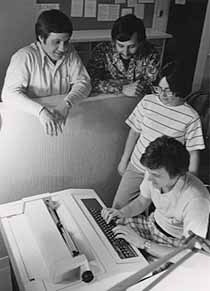The Multiplier Effect: Dartmouth's Capacity to Make Change
Connecting with Inner-City Communities
Much of Ron's work in college centered on applying computational methods to sociological problems. He worked with Project IMPRESS (Interdisciplinary Machine Process Research and Experimentation in the Social Sciences) and participated in a program in Roxbury, MA with the Community-University Center for Inner-City Change.
The McLane report in 1968, created by the Trustees' Committee on Equal Opportunity said "elite institutions like Dartmouth thrived from tradition, but that 'tradition alone is a vacuum.'" (Bradley, 156 ). They suggest the expansion of education at Dartmouth to include a Black Studies department, for which The AAm had been calling. This was part of a national movement in the late 60's to establish Black Studies programs. In his article on this movement, Fabio Rojas says "African-American Studies programs are one of the black student movement's most visible and enduring achievements. Approximately 120 universities have instructional units offering African-American Studies degrees. Another 100 campuses offer minor degrees and nondegree certifications. " In 1970, the program at Dartmouth was established under the guidance of Robert McGuire. The class Ron taught was on community development and organization, and students worked with the Roxbury center to solve real-world problems.
These programs were an important part of breaking out of the Dartmouth "bubble," and encouraged students to use the education they were gaining and share that wealth of knowledge. It also taught these students to learn to work with communities in true partnerships and recognize the expertise community members bring to the table.
"At that early age, I understood the gap, wealth, and resource gap in this country. So, I decided I was going to dedicate my life to doing whatever I could to take the powers that Dartmouth gave me and bring that back home. I chose to do it intellectually; I would bring the knowledge back and follow a career in education."
Ron Talley
One of the parts of our conversation that stuck with me was Ron's discussion of the multiplier effect that Dartmouth had, and still has, the possibility for. When he was a student, effort by Black students went into making sure the resources they gained at Dartmouth were being taken back to their community and other disadvantaged communities. Over time, that effort seemed to dwindle. The College focused "on bringing in the students who were most academically prepared for Dartmouth, most able to pay for their education, who are most like other Dartmouth students," Ron said. "Those students, I think, were perfectly willing to graduate from Dartmouth and go out and work in mainstream America. The issues that poor people and Black people face were not really their problem. They had never experienced it and they were not interested in becoming involved."
Now, Dartmouth students and administration seem to be more concerned with personal monetary goals, instead of using the education and expertise of Dartmouth to impact the lives of others. A shift away from this is possible, but a supportive administration is not enough. Learning from students of the past, current students at Dartmouth have more power to make change, at Dartmouth and abroad, than we realize.

